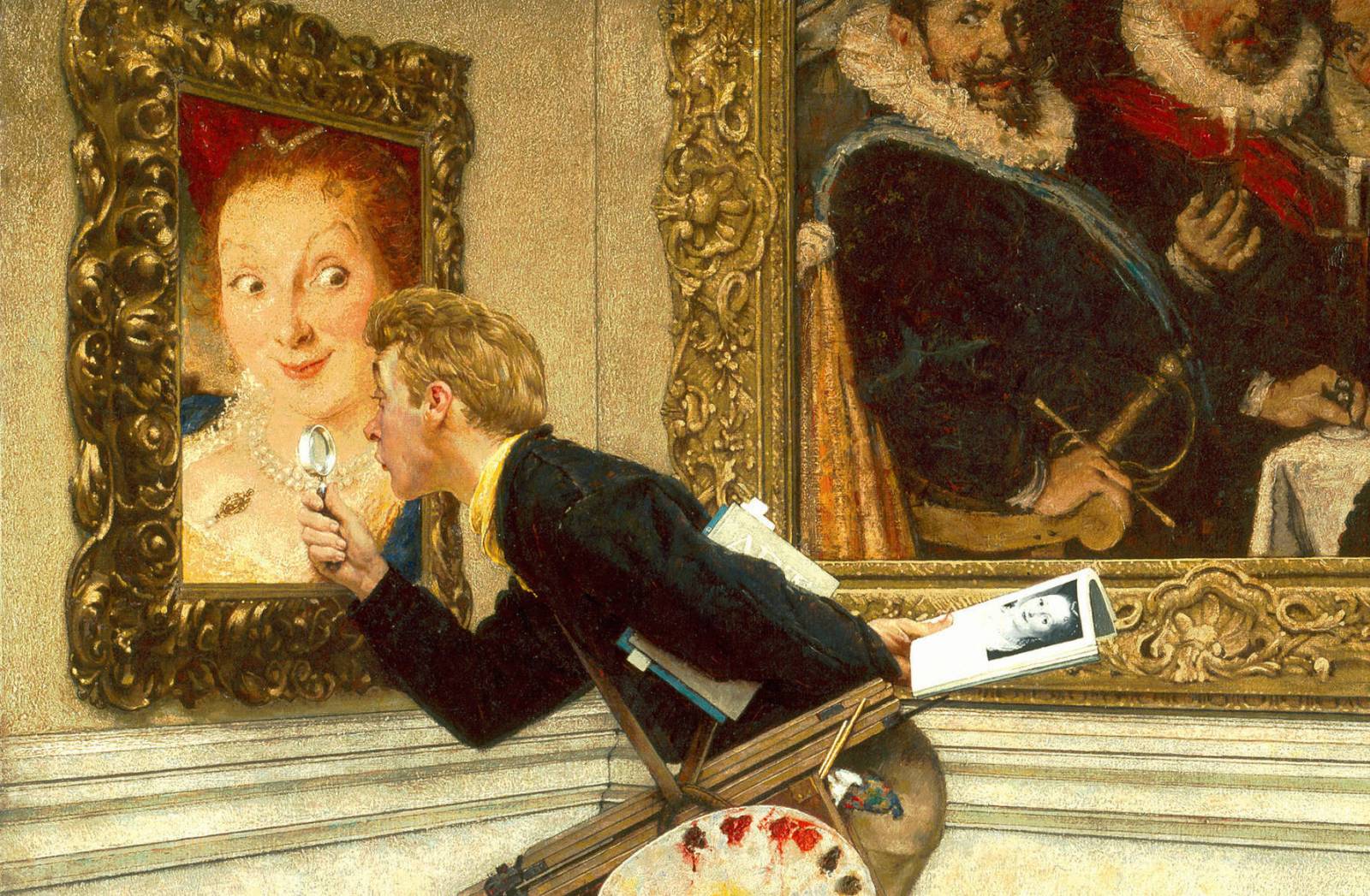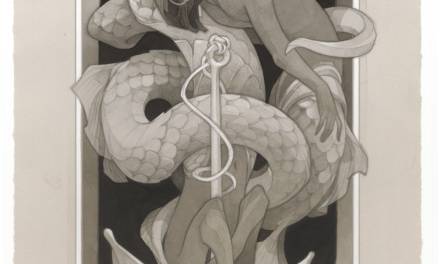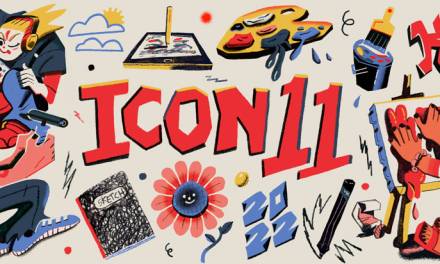-By Marc Scheff
Hi, I’m Marc. I run Drawn and Drafted, Dear Art Director, and the online gallery Every Day Original with Lauren Panepinto I teach two classes at Smart School, and I make artwork. I went to art school in California. I also spent time in the tech world before that with the design team as a front-end engineer. I have and continue to spend a lot of my life in critique sessions.
Personally I’ve given hundreds, maybe thousands of portfolio reviews to artists. And constructive critiques have been the fuel for my own work and career. I’ve seen how constructive critique can build an artist up, and feed them through the next phase of work, and help them reach new levels. But unfortunately a poorly done critique can discourage and demotivate an artist.
That’s why when I saw people talking on Twitter about crits that made them want to give up and quit, I wanted to share a better way. At first I thought my thread was just for instructors, but I realized in the end that this is mainly for you: artists, professionals, students, anyone who gives or especially gets a critique.
Some of what you see here is from that thread, and I have added more detail and more personal stories about how good constructive critique has changed my life for the better.
How to Constructively Critique
1. Remember the goal: this person wants to make good art. A good critique gives them new insight, new direction, and energy to do that. At the end of the critique they should feel equipped and excited to get to work.
2. Notice what you like. That might be line quality, something quite improved, or even just noticing the work and effort they put in. Really, noticing the effort helps with point 1, the goal.
3. Offer perspective on where they need work. Again, something specific or something about their approach. Maybe they need to work on figures or color or composition, or maybe they just need to make more work.
I’ll add to #3 that this should be as honest as you can. This is a gift IF delivered with point #1 in mind. And for what it’s worth, the aggressive make-you-cry critiques get this wrong. There’s a way to tell someone they have work to do that excites them to get to it, and doesn’t make them want to curl up in the fetal position
And don’t overwhelm. If there’s a lot to work on, pick one or two things they can bite off.
4. At the end, circle back: remind them of what’s working, encourage them to KEEP doing that, and offer real suggestions on how to improve the weaker points. If they need to learn something, give them resources to dig deeper, or a set of shorter exercises to learn on their own.
In my humble opinion as an instructor, half of teaching is convincing someone to keep trying. One way to do that is not just cheerleading, but sharing tools, resources, and next steps, showing someone their next moves.
It costs nothing to believe in someone who is putting in the work. And you reap immense emotional rewards when you watch them succeed with your encouragement.
Some Q + As
“If your arts and works are reliant on feedback then you aren’t an artist”
That was an actual response to my thread. And, to be frank, it’s wrong.
Anders Ericsson is perhaps the pre-eminent researcher on expert performance, ie. how to build skill and expertise. In his book “Peak: Secrets from the New Science of Expertise” he outlines how you build skill. I’ll spoil it, you don’t sit by yourself making work for 10,000 hours, In fact, that number came from Ericsson’s study of violinists at Berlin’s Academy of music where students didn’t just practice, they did so with strong feedback loops from 2 key groups: instructors and peers.
In a nutshell, you have to get feedback as fuel for how you will try again. The feedback helps you plan small changes to evolve your skill when you try again. Athletes are familiar with this concept, or what habit expert James Clear calls the 1% rule, the art of continuous improvement.
So, yes, get critiques. Give good ones. They work. Next question.
Why share resources, if I’m supposed to be the expert won’t that make me look like less of an artist?
You don’t have to be an expert to give a good critique.
Don’t hold yourself to an impossible standard of perfection. Or, think of it this way, if you’re growing as an artist then there’s always more for you to learn so nobody should expect you have all the answers.
Sidebar: if you think you have all the answers then you might google Dunning Kruger.
If you’re a Muddy Colors reader or a Smart School alum, you already know that this mindset of being a critique-imposter is BS. One of the things I love about this community is the thirst for knowledge and the deep understanding that we are all on that journey together. A good artist is never finished learning.
My best guess on teachers who are hesitant to share tools is that they’re afraid of looking like they don’t have all the answers and aren’t a good enough expert to be giving critique. My response is, yeah, obviously, nobody does. In the world of mentoring and coaching it’s a commonly held belief that the mentee has the answers they need. It’s not the coaches’ job to always have experience, but to help the mentee use their own experience to put two and two together. I can’t tell you what your next step is, I can absolutely help you figure it out.
Once that’s settled, offering resources will give a mentee something to take action on after the critique is done and they’re back to work.
What if you really think they don’t have a chance in X industry? Shouldn’t you be honest?
It’s not your job to decide who is and isn’t capable of running the marathon, your job is just to be truthful about how far the path is, point them in the right direction, and give them a few steps to get them headed in the right direction.
Go the extra mile. Offer them guidance on where they might fit. Give them the confidence to look beyond markets where they assumed they wanted to be. I do see students working hard to achieve a finish that looks like an artist they admire, and sometimes you can see it’s a struggle. So you go back to point #1, they want to make good art. Remember that and help them from that place.
I’m actually a good example of this. In 2011 or 2012 I was in a mentorship with Rebecca Guay. I was making digital work and most of what I knew was from people I met at the IMC. I was working to build a body of work that had tons of rendering, lighting, multiple figures, the works! I was maybe doing fine, even getting work, but it was a struggle. One day I had little to show so I showed a sketch. It was quick, it was “nothing,” and “not really worth spending time on,” I said. But Rebecca stopped, and asked me if I could do a full piece in that same fashion. It was a real 180 from the work I’d been making, but part of getting a good critique is being coachable, so I gave it a shot. My work shifted almost overnight to a style that got me more work in a different market, and more importantly I had more fun making it. Rebecca has said “don’t throw out with two hands what comes easy” and sometimes it takes a good critique to help someone really take that to heart, even if that means a change in the direction you thought you were heading.
Ok so how do you encourage someone when you see something that isn’t working but you aren’t sure what the answer is?
Another example, also me, also Rebecca. I had been making digital work for a while and she encouraged me to work traditionally. I was working on a large piece and something wasn’t quite right, but I couldn’t tell what it was so I sent it to her.
She told me it’s good, but it could be great. Let that phrasing sink in.
She didn’t say “it’s not great” she said “it could be.” She did say it was good, but that almost doesn’t matter. What I heard was it could be great and therefore she believed that there was a way that I could make it great. I was excited to hear this secret way of making it great that I could definitely do!
Denouement: She suggested the face could be better. That’s when I started keeping my sketchbook of head studies. And it was directly through that practice that I evolved into the resin work that I’m now known for. Best. Critique. Ever.
I’m a student/new artist and I don’t control my critiques, how does this help me?
I think it’s incredibly useful to have this understanding as a student, to know what you should be getting from a critique. When I went back to art school I had already watched design crits at a tech firm. I knew it was ok to ask for more info, more specifics. And if someone just wanted to rip on the work, the work wouldn’t improve.
So as a newbie or a seasoned pro, ask for these things. Ask for specifics. Ask for tools and resources where you can learn more. Ask for clarity if you need it. And ask for, nay, _expect_ support in reaching your goals. You are putting in the work and that’s absolutely worth something.
One of the best crits I ever got was from a notoriously tough AD. This was Illuxcon, maybe around 2011 or 2012. I showed him my book and he looked and said “cool thanks”
Silence. It was clear the review was done.
I said I knew it needed work and did he have time to share what he thought I could focus on next. Any specifics would be amazing.
He sat with me for another 45 minutes going through every piece pointing out flaws and what I needed to work on. He grabbed my sketchbook and worked out composition fundamentals with me, answering all of my questions.
I could have let it go at “cool thanks” and gone back to my hotel room, crushed. But just asking for a good critique got me one I sincerely won’t ever forget.
So, you do actually have control over your critique. When you introduce yourself, mention your level of experience and what you want to get out of the review. Do you want feedback on where you need work, or to know if you’re a good fit for that AD, or some suggestions on where you might find your niche? Let them know. Most of my reviews are actually the third option, folks looking for some direction. Letting your reviewer know definitely helps set expectations for both parties.
That’s nice for you but what about me?
My perspective is white, male, cishet presenting, i.e. privileged. If you’re someone who experiences prejudice or dismissal of your work for your gender presentation or skin color, find allies who will stand with you to demand these things for you. And honestly if you have an instructor who is exhibiting the kind of problematic behavior I’m hearing about (mean crits, ignoring students who are female, LGBTQI, or BIPOC) please know for sure that is not ok.
I acknowledge this is easy for me to say, and not easy for everyone to do. So here are a few suggestions.
If an AD treats you poorly in a critique, good, you dodged a bullet!. You DON’T want to work with them. You won’t find success working for someone who treats you like trash at step one.
There are plenty more ADs at plenty more companies. Ask your peers or ask us where to find more.
If it’s a teacher who is acting this way, ask to switch classes. Find a teacher who wants you to win. Ask to work with them.
I had an instructor in art school who wouldn’t answer my questions. I asked him why he started his drawing a certain way and he told me, “You can do what you want, you’re just wrong.” I … had no idea what I wanted except to understand his approach, so, ouch. It was hard because his work was so good, but his critiques were not. You can’t learn from someone, no matter how good they are at making art, if they can’t get that information to your brain too.
In closing
You’re not alone. Everyone is nervous and scared and afraid that they might give up. Nobody is good at taking critique right away and not everyone, even instructors, are perfect at giving it. Everyone has imposter syndrome, on both sides of the table.
So, ask for what you want, feedback, specifics, tools and resources to move forward, that helps a reviewer help you. Band together, look out for each other, find the helpers, and get good constructive critiques! Maybe it’s another student, AD, teacher, or someone with more privilege.
We exist and will stand with you. You deserve this.
* * *
You can find our online community where people ask and answer questions big and small at https://gumroad.com/drawnanddrafted
If you want one one one time with some of the best in the industry, head to https://www.smarterartschool.com/
And finally, super burying the lede here, Lauren and I are launching a portfolio review service with industry ADs very soon. Sign up to get an email when we do.








Great guidelines to refer back to! Thanks Marc!
Marc these are helpful points! Speaking for myself, I think how to receive a critique as well as learning how to share a constructive critique are something I learned over time (am still learning both).
One of my first portfolio reviews after my art training was, well, the reviewer didn’t know what to tell me because I only had a vague idea of what I wanted to do and it wasn’t in their field. Instead we focused on the fundamentals. That was an educational experience. I learned to try to make it clear I’m at a review to either learn about a particular field and to get feedback on how my work does or does not yet fit that field, or where they see I might improve skills, rather than having the poor reviewer have to guess at what I was looking for.
Hey Mark,
So wonderfull to see you post on MC. As you know I’m a big fan of all the teachers and it’s such a welcome sight to see you here with the gang.
(For Dan : A REALLY BIG BIG THANK YOU TO MUDDY COLORS FOR HAVING MARC ON HERE)
I have always loved your critiques in class, whether it was in Greg’s class or your own, and it is thanks to both your and Greg’s comments that I have been able to grow. I remember that first semester with you when I had, what I realise now, some very unrealistic expectations.
The way you and Greg (in later semesters) motivated me has led to a continuing evolution of the work I make. And the secret to how you did that is just what you describe in the article above.
One nuance I’d like to add to your article is that as the critiquer you do need to be carefull not to put someone on a pedestal when it’s not merritted. The main problem with that is that it makes people float and you loose the ability to progress. (This is not a problem in your classes). In a way the critique is dishonest because the critiquer doesn’t dare tell the truth.
You and Greg (and Donato) have always been very straightforward in a very nice way, and told honestly what you thought, steering us students to allow us to tackle the next hurdle that you guys knew was coming up. (I’m certain it’s pretty much the same with the other teachers at SmartSchool as well).
Thank you Mark, and next time we meet, I still owe you a beer (as I do to Greg and Donato as well).
On that note, a question for Dan, is that Critique website you set up a couple of years ago still up. I did join up, but there was never really a critique in that group (at least not in the group I joined)
Thank you for bringing up this topic. Critiquing creative efforts is HARD! As a design professor, I often follow similar steps in class critiques. For the particularly sensitive kind (which is, to be honest, 90% of my students), I employ an “in a dream world” or a “wish list” method to point out the areas of potential growth or techniques that need work. I do an overview, noticing the strengths and the gaps, and then present my “in a dream world” scenario to create that “stretch” goal.